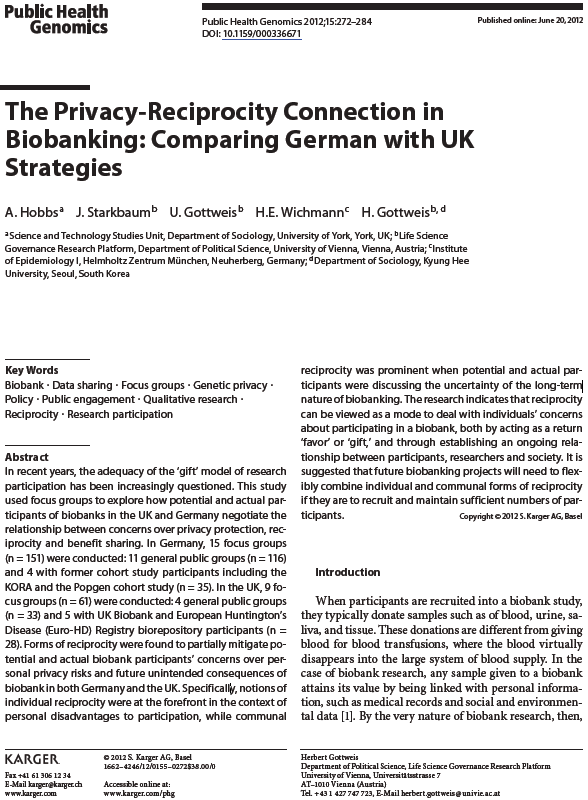
| Title |
: The Privacy-Reciprocity Connection in Biobanking: Comparing German with UK Strategies |
| Date |
: 2012. 6. |
| Journal title |
: Public Health Genomics |
| Author |
: A. Hobbs, J. Starkbaum, U. Gottweis, H.E. Wichmann, and H. Gottweis |
| Contact us |
: csts@khu.ac.kr |
| Abstract |
: In recent years, the adequacy of the ‘gift’ model of research participation has been increasingly questioned. This study used focus groups to explore how potential and actual participants of biobanks in the UK and Germany negotiate the
relationship between concerns over privacy protection, reciprocity and benefit sharing. In Germany, 15 focus groups (n=151) were conducted: 11 general public groups (n=116) and 4 with former cohort study participants including the KORA and the Popgen cohort study (n=35). In the UK, 9 focus groups (n=61) were conducted: 4 general public groups (n=33) and 5 with UK Biobank and European Huntington’s Disease (Euro-HD) Registry biorepository participants (n=28). Forms of reciprocity were found to partially mitigate potential and actual biobank participants’ concerns over personal privacy risks and future unintended consequences of biobank in both Germany and the UK. Specifically, notions of individual reciprocity were at the forefront in the context of personal disadvantages to participation, while communal reciprocity was prominent when potential and actual participants were discussing the uncertainty of the long-term nature of biobanking. The research indicates that reciprocity can be viewed as a mode to deal with individuals’ concerns about participating in a biobank, both by acting as a return ‘favor’ or ‘gift,’ and through establishing an ongoing relationship between participants, researchers and society. It is suggested that future biobanking projects will need to flexibly combine individual and communal forms of reciprocity if they are to recruit and maintain sufficient numbers of participants.
Click the following link for downloading the article: http://europepmc.org/abstract/med/22722691 |
|

